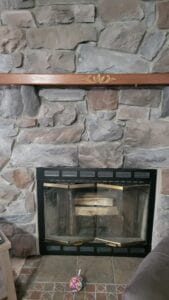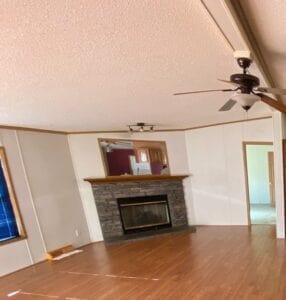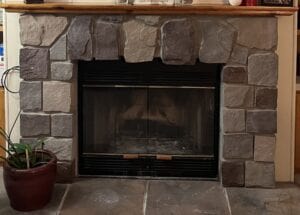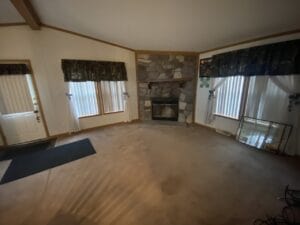Hey there, mobile home dweller! Looking to add some sizzling flair to your cozy abode? Well, you’re in for a treat because we’re about to dive into the world of mobile home fireplaces. These little wonders are not only about keeping you warm on chilly nights but also adding that touch of ambiance that makes your living space feel like a true hearth and home.

Mobile Home Fireplaces
Now, There’s no shortage of options to suit every taste. From sleek and modern stoves to charming traditional designs, these fire-breathing appliances come in all shapes and sizes. And guess what? Installing one in your mobile home can actually increase its value and appeal. It’s like adding a dash of spice to your already delectable recipe!
So, if you’ve been dreaming of cozying up by the fire while enjoying the comforts of your mobile home We’ll guide you through everything you need to know – from testing different fireplace types to finding reputable manufacturers who can ignite your imagination (figuratively speaking). Get ready for some fiery fun!
Mobile Home Approved Fireplace Options
It’s important to consider options that are specifically designed and approved for use in these unique spaces. Fortunately, there are several fireplace options available that meet the safety requirements and regulations for mobile homes.
Electric Mobile Home Fireplaces: Convenience and Safety Combined
Electric fireplaces have gained popularity among mobile homeowners due to their convenience and safety features. These fireplaces offer a hassle-free heating solution without the need for venting or chimney installation. Here are some key reasons why electric fireplaces are a great option:
Easy Installation: Electric fireplaces can be installed effortlessly in any room of your mobile home. They come in various sizes and styles, allowing you to choose one that complements your interior decor.
Convenience: With just a flip of a switch or push of a button, you can enjoy the warmth and ambiance provided by an electric fireplace. No need to worry about gathering wood or cleaning up ashes.
Safety Features: Electric fireplaces eliminate the risk of accidental fires caused by sparks or embers commonly associated with traditional wood-burning units. They often include features like automatic shut-off timers and cool-to-touch surfaces, making them safer for families with children or pets.
Energy Efficiency: Many electric fireplaces come with energy-saving modes and adjustable heat settings, allowing you to efficiently warm your space while keeping utility bills under control.
Wood-Burning Mobile Home Fireplaces: A Cozy Option with Proper Ventilation

If you prefer the natural charm of a wood-burning stove in your mobile home, there are options available as well. However, it is crucial to ensure proper ventilation to comply with safety regulations. Here’s what you need to know:
Approved Models: Look for wood-burning stoves specifically designed and approved for use in mobile homes. These models are constructed with features that meet the necessary safety standards.
Ventilation Requirements: Proper ventilation is essential when using a wood-burning stove in a mobile home. This typically involves installing an approved chimney system that directs the smoke outside.
Clearance and Installation: Ensure that you follow the manufacturer’s guidelines regarding clearance distances from combustible materials, such as walls or furniture, during installation. Adhering to these specifications will help prevent fire hazards.
Wood Selection: Choose dry and seasoned firewood to ensure efficient burning and reduce the risk of excessive smoke or creosote buildup inside your stove and chimney.
The Safety of Mobile Home Fireplaces
Mobile home fireplaces are designed with safety as a top priority. These fireplaces undergo rigorous testing to ensure they meet industry standards and provide a safe heating option for mobile homeowners. However, it is important to understand that proper installation and regular maintenance play a crucial role in ensuring the ongoing safety of these fireplaces.
Rigorous Testing for Safety: Mobile Home Fireplaces
Manufacturers subject mobile home fireplaces to extensive testing procedures before they are made available to consumers. These tests evaluate various aspects such as heat output, ventilation requirements, and overall performance. By adhering to strict safety guidelines, manufacturers can confidently offer fireplaces that meet the necessary safety standards.
Proper Installation and Regular Maintenance
Ensuring the safe operation of a mobile home fireplace starts with proper installation. It is essential to follow manufacturer guidelines during installation to minimize any potential risks. This includes positioning the fireplace correctly within the mobile home and ensuring adequate clearance from combustible materials.
Regular maintenance is equally important for maintaining fireplace safety. This involves cleaning the chimney or vent regularly to prevent blockages that could lead to smoke or carbon monoxide buildup. Inspecting the fireplace for any signs of wear or damage on a regular basis helps identify potential hazards early on.

Following Manufacturer Guidelines: Mobile Home Fireplaces
To maintain optimal safety levels, it is crucial to follow manufacturer guidelines when using your mobile home fireplace. One key aspect is using the correct fuel type specified by the manufacturer. Using improper fuels can pose serious safety risks, including increased chances of chimney fires or harmful emissions.
Moreover, following recommended operating procedures ensures safe usage. For instance, lighting fires only when you are present allows you to monitor them closely and address any issues promptly. Similarly, avoiding overloading the fireplace with excessive fuel minimizes the risk of overheating or other malfunctions.
Installing a Mobile Home Fireplace
Professional installation is highly recommended. This ensures that the fireplace is properly placed and connected, minimizing any potential risks or issues. Here are some important factors to consider during the installation process.
Factors to Consider
Available Space: Before installing a fireplace in your mobile home, you need to assess the available space. Measure the area where you plan to install the fireplace to ensure it fits properly without obstructing walkways or other essential areas.
Access to Fuel Sources: Consider how you will fuel your fireplace. Mobile homes typically use propane or electric fireplaces due to their convenience and safety features. Determine which option works best for you based on accessibility, cost, and personal preference.
Proximity to Combustible Materials: Safety should be a top priority when installing a fireplace in any home, especially in a mobile home where space may be limited. Ensure that there is enough distance between the fireplace and any combustible materials such as curtains, furniture, or wooden walls.
Local Building Codes
It’s crucial to familiarize yourself with local building codes before proceeding with the installation of a mobile home fireplace. Different areas may have specific requirements or restrictions regarding fireplaces in mobile homes. By adhering to these codes, you can ensure compliance and avoid potential legal issues down the line.

Professional installers are well-versed in local codes and regulations pertaining to mobile home fireplaces. They can guide you through the process and handle all necessary permits if required by your local authorities.
Hiring Professional Installers
Installing a mobile home fireplace involves intricate work that requires expertise and knowledge of safety protocols. While DIY installations may seem tempting, it’s strongly advised against due to potential hazards associated with improper installation.
Hiring professional installers not only guarantees proper placement but also provides peace of mind knowing that experts are handling the job. They have the necessary tools, experience, and skills to ensure a safe and efficient installation.
Ensuring Proper Ventilation for Mobile Home Fireplaces
Adequate ventilation is crucial when installing a fireplace in a mobile home to prevent the buildup of carbon monoxide, ensuring the safety and well-being of occupants.
Direct Venting Systems
One option for proper ventilation in mobile home fireplaces is to utilize direct venting systems. These systems are designed to draw combustion air from outside the home while simultaneously expelling exhaust gases. With direct venting, there is no need for an existing chimney structure or modifications to accommodate the fireplace installation.
Direct venting offers several advantages. Firstly, it eliminates the risk of smoke damage within the living space since all combustion byproducts are efficiently expelled through a separate vent pipe. Secondly, it helps maintain good indoor air quality by preventing gases like carbon monoxide from entering the living area. These systems provide better control over airflow and temperature regulation.
Utilizing Existing Chimney Structures with Modifications
Another option for mobile home fireplace ventilation involves utilizing existing chimney structures with appropriate modifications. This approach may be suitable if your mobile home has an existing chimney that can be retrofitted or modified to accommodate a fireplace.
When considering this option, it is essential to ensure that the chimney complies with regulations regarding clearance and proper functioning. A thorough inspection should be conducted by a professional to assess its structural integrity and suitability for use with a fireplace.
Modifications may include installing a flue liner or other components necessary for safe operation. It’s important to note that not all chimneys are compatible with modern fireplace designs, so consulting with experts in chimney modification is highly recommended.
Regular Inspection of Vents and Flues: Mobile Home Fireplaces
Regardless of which venting option you choose, regular inspections of vents and flues are vital to maintain optimal airflow and ensure the safe operation of your mobile home fireplace.
Inspecting vents and flues allows for early detection of any blockages or damage that may impede proper ventilation. Over time, soot, debris, or even bird nests can accumulate in the venting system, obstructing airflow and potentially causing dangerous conditions.
By scheduling regular inspections with certified professionals, you can identify and address any issues promptly. They will clean the vents and flues as needed to prevent potential hazards and maintain efficient airflow.
Understanding the BTU Output: Mobile Home Fireplaces
One crucial factor to consider is the BTU (British Thermal Unit) output. The BTU output determines the heating capacity of a fireplace in terms of heat production per hour. By choosing an appropriate BTU output, you can ensure efficient heating without overloading your mobile home’s heating system. To make an informed decision, several factors should be taken into account, including room size, insulation levels, and climate.
Room Size: The size of the room plays a significant role in determining the ideal BTU output for your mobile home fireplace. A larger space will require a higher BTU rating to effectively heat the area. On the other hand, if you have a smaller room, a lower BTU output would suffice. It’s essential to strike a balance between providing sufficient warmth and avoiding excessive energy consumption.
Insulation Levels: Another crucial consideration when selecting the right BTU output is the insulation level of your mobile home. Proper insulation helps retain heat within your living space and prevents it from escaping through walls or windows. If you have well-insulated walls and windows with double glazing, you may not need as high of a BTU rating compared to a poorly insulated home.
Climate: The climate in which you reside also influences the appropriate BTU output for your mobile home fireplace. Colder climates typically require higher BTUs to combat freezing temperatures effectively. Conversely, if you live in a milder climate where winters are relatively mild, a lower BTU rating might be sufficient.
Further Insight into BTU: Mobile Home Fireplaces
To provide further insight into choosing an appropriate BTU output for your mobile home fireplace, let’s consider some examples:
For a small-sized room with good insulation situated in a mild climate zone:
Opting for a fireplace with around 5,000-10,000 BTUs would be suitable.
This range ensures adequate heating without overpowering the room or consuming excessive energy.
If you have a larger living area with average insulation levels located in a colder climate:
A fireplace with 15,000-20,000 BTUs would be more appropriate.
This higher BTU output compensates for the larger space and helps combat colder temperatures effectively.
Remember that these examples are just general guidelines. It’s always recommended to consult with professionals or refer to manufacturer specifications to determine the exact BTU output required for your specific mobile home setup.
Pros and Cons of Having a Fireplace in a Mobile Home
Pros: Added Warmth, Cozy Atmosphere, Potential Energy Savings, Increased Home Value
Having a fireplace in a mobile home can bring numerous benefits, making it an attractive feature for homeowners. Let’s explore the pros and cons of having a fireplace in your mobile home.
One of the primary advantages of having a fireplace is the added warmth it provides. During cold winter months, there’s nothing quite like gathering around the crackling fire to keep cozy. The radiant heat emanating from the flames creates a comfortable ambiance that can quickly warm up your entire living space.
In addition to the physical warmth, a fireplace also adds to the overall atmosphere of your mobile home. The flickering flames create an inviting and intimate environment that enhances relaxation and quality time with loved ones. Whether you’re curled up with a book or enjoying conversations with friends, the presence of a fireplace creates an undeniable charm.
Another Benefit: Mobile Home Fireplaces Energy Savings
Another potential benefit is energy savings. While central heating systems are common in mobile homes, they often consume substantial amounts of electricity or fuel. By utilizing your fireplace as an alternative heat source, you can potentially reduce your reliance on these costly methods and save money on utility bills.
Moreover, having a fireplace can increase the value of your mobile home. Many prospective buyers find fireplaces appealing due to their aesthetic appeal and functional advantages. If you ever decide to sell your property in the future, having a well-maintained fireplace could be an enticing selling point that sets your mobile home apart from others on the market.
Cons: Maintenance Requirements, Potential Fire Hazards if not Properly Maintained, Limited Fuel Options for Certain Fireplace Types
While fireplaces offer several advantages for mobile homeowners, there are also some drawbacks worth considering before installing one.
Maintenance requirements can be demanding. Regular cleaning is essential to remove ash buildup and ensure proper ventilation. Chimneys should be inspected and swept annually to prevent the accumulation of dangerous creosote, which can lead to chimney fires. Neglecting maintenance tasks can compromise the safety and efficiency of your fireplace.
Fire hazards are a significant concern if fireplaces are not properly maintained. Creosote buildup, faulty flues, or improper installation can increase the risk of house fires. It is crucial to follow safety guidelines and have professionals inspect your fireplace regularly to mitigate these risks.
Certain types of fireplaces in mobile homes may have limited fuel options. Wood-burning fireplaces require a constant supply of firewood, which might not be readily available or practical for everyone. On the other hand, gas or electric fireplaces offer more convenience but may limit the authentic ambiance that comes with burning real wood.
Enhancing Your Mobile Home with a Fireplace
Congratulations! You are now equipped with the knowledge to enhance your mobile home with a beautiful fireplace. By exploring the various options available, understanding safety considerations, and ensuring proper installation and ventilation, you can create a cozy and inviting atmosphere in your mobile home.
Imagine curling up by the crackling fire on a chilly evening, feeling the warmth envelop you as you relax and unwind. Not only will a fireplace add charm to your space, but it can also provide an additional source of heat during colder months, reducing your reliance on other heating methods.
Now that you have all the information you need, why wait? Take the next step towards transforming your mobile home into a haven of comfort and style. Explore different fireplace options that suit your taste and budget, consult professionals for installation guidance if needed, and start enjoying the benefits of having a fireplace in your mobile home today!
FAQs: Mobile Home Fireplaces
Can I install a fireplace in any type of mobile home?
Yes, most types of mobile homes can accommodate fireplaces. However, it is essential to check local building codes and regulations specific to manufactured or modular homes before proceeding with installation.
Are there any safety concerns I should be aware of when installing a fireplace in my mobile home?
Absolutely! Safety should always be a top priority. Ensure proper clearance between combustible materials and the fireplace unit, use approved venting systems designed for mobile homes, install smoke detectors near the fireplace area, and follow manufacturer’s guidelines for maintenance.
What are some advantages of having a fireplace in my mobile home?
Having a fireplace in your mobile home not only adds aesthetic appeal but also provides supplemental heat during colder months. It creates an inviting ambiance for relaxation and socializing while potentially reducing heating costs.
Will adding a fireplace increase my energy bills?
The impact on energy bills depends on various factors such as fuel type (wood-burning vs. gas), insulation, and the frequency of fireplace usage. Gas fireplaces tend to be more energy-efficient, while wood-burning fireplaces require a constant supply of fuel.
Can I install a fireplace myself, or should I hire a professional?
While some individuals may have the necessary skills and experience to install a fireplace themselves, it is generally recommended to hire a professional. They can ensure proper installation, adherence to safety regulations, and provide guidance on selecting the right fireplace for your mobile home.
You might also be interested in our articles:
Log Cabin Style Manufactured Homes

